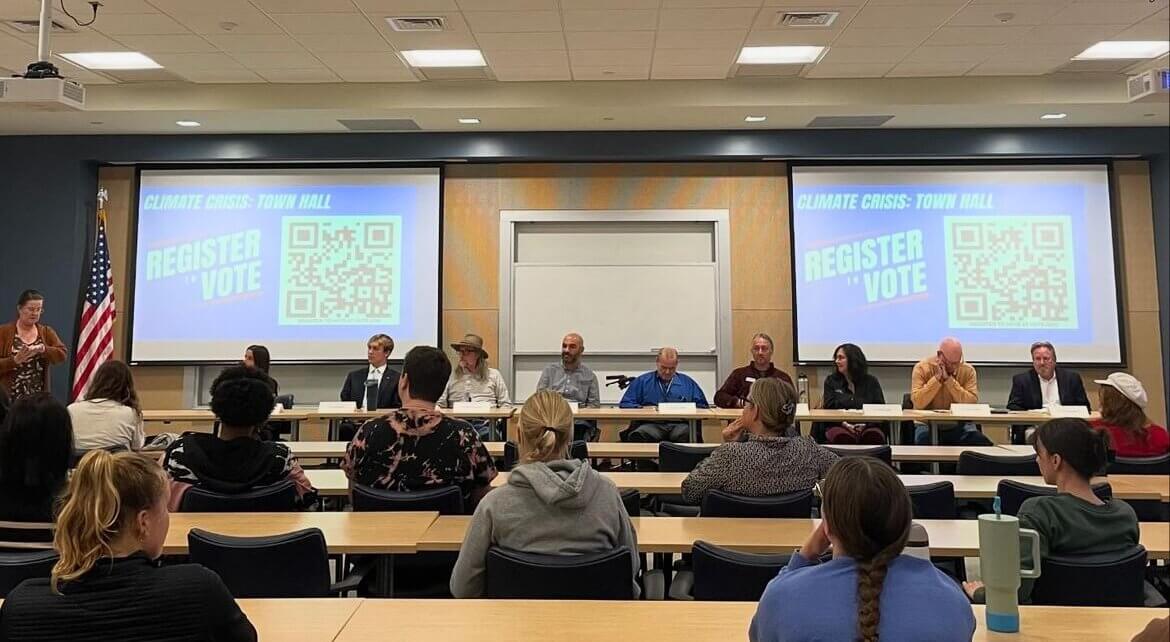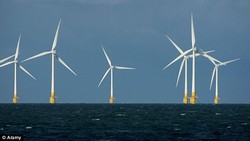The event, attended by roughly 55 students, allowed each professor to speak broadly before Dr. Duckett and Dean Coyle read questions submitted by the audience. Dr. Daneshgar is a plant biologist in New Jersey and the Caribbean and said on climate change, “I, on a daily basis, see these impacts and the damage caused.” Dr. Jacques spoke on the need for government action, “an incurable part of American politics is casting doubt on climate change.” Dr. Jeffrey discussed how businesses contribute to carbon emissions and pollution, citing that less than 20% of sodas are recycled. Dr. Adolf discussed how climate change is impacting fishermen and women and the need to shift to renewable energy. Dr. Deepak read from United Nations (UN) reports and how the effects of climate change “disproportionately impact the least powerful communities.” Professor Comiskey talked about the need for America to develop a response given the threat posed by China and other nations. Dr. Herrington said, “the climate is changing quickly, it’s not this long-term issue any longer, we’re looking at a foot of sea level rise by 2050.”
Dr. Jacques discussed the challenges of climate change through our political system. He said, “the role of fossil fuels in our political system is massive,” and “I don’t think we go to these talks and are seen as a leader,” referencing the Paris Climate Accord. Dr. Daneshgar said, “we’ve been villainizing scientists, like how many shows or movies did you watch growing up where there was an evil scientist or doctor?” He discussed the need for more climate education, “a bigger, more fundamental issue is where are you learning science to begin with? We need to build the foundation of science in grade school.” Zafira Demiri is the CCLC Communications Graduate Assistant and agreed with Dr. Daneshgar, “New Jersey is the first state to require climate education across all subject areas in K-12 schools. This alone should be proof that it is in the best interest of humanity that we all make efforts to learn and teach one another about the gravity of this issue and how it affects every area of our lives.”
An audience question was regarding solutions to climate change and Comiskey joked, “if anyone could answer that, you’d win the Nobel Peace Prize.” Dr. Adolf responded, “climate change is so complex, there is so much to do, you have to approach it with hard work from lots of different perspectives.”
Following the event, Demiri said, “The Climate Crisis: Town Hall is part of the Climate Teach-In, a series of events focused on climate change awareness going back to 2019. Although the MU CCLC does not run the Teach-In (it is an initiative through the School of Science), we are huge proponents of it!” Demiri continued, “I hope students were able to take this Town Hall as a model of civil discourse and the interdisciplinary nature of climate change. This was a fantastic example of how we can communicate about topics that are ‘political’ with respect for one another’s beliefs and expertise (and most importantly, listening to scientists who work on this issue every day!). I also hope students were able to realize, with the insight of our experts, that fighting climate change is a non-partisan issue. Among our experts and student representatives, everyone had varying political affiliations; regardless, they all agreed that the climate crisis is an existential issue of the utmost importance. Additionally, because of this issue’s importance, we must keep it in mind as we vote locally and nationally because of the impact it will have globally.” The event featured QR codes to register to vote ahead of the 2024 elections.
Demiri encourages more students to learn about climate change through the events provided by the CCLC and the School of Science, “This series provides the opportunity for students to hear from and communicate with experts about the impacts of climate change and potential solutions with the goal of improving life for all living things. I would urge every student at Monmouth to attend a Climate Teach-In whenever they can, no matter their major.” The next Teach-In is on Jan. 27, 2025, with Dr. Robin Leichenko in Pollak Theater at 6:30 p.m. and is titled, “Exploring the ‘How’ of Sustainability Transformations.”



